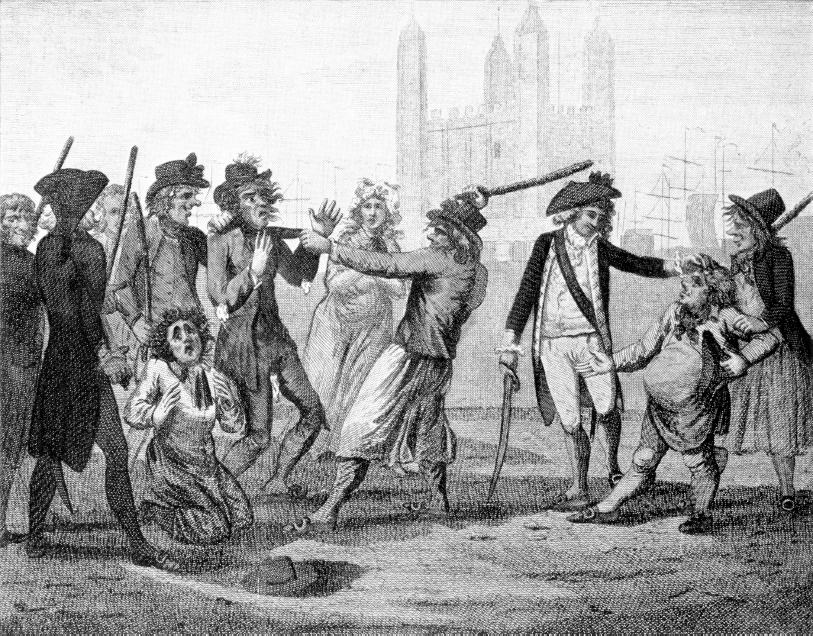Exploring American Histories: Printed Page 138
Exploring American Histories, Value Edition: Printed Page 119
Common Grievances

Like the Proclamation Line, which denied all colonists the right to settle beyond the Appalachian Mountains, the policy of impressment affected port city residents of all classes. British agents, desperate for seamen during the extended European wars of the eighteenth century, periodically impressed sailors and other poor men from British ports around the world, including seaboard cities in North America, and from merchant ships at sea. Impressment had been employed for decades by the time of the French and Indian War. Increasingly, however, merchants and other well-to-do American colonists joined common folk in demanding an end to this practice.
Seamen and dockworkers had good reason to fight off impressment agents. Men in the Royal Navy faced low wages, bad food, harsh punishment, rampant disease, and high mortality. As the practice escalated with each new war, the efforts of British naval officers and impressment agents to capture new “recruits” met violent resistance, especially in the North American colonies. At times, whole communities joined in the battle—relatives and friends, blacks and whites, women and men.
In 1757, in the midst of the French and Indian War, some 3,000 British soldiers cordoned off New York City and visited “the Taverns and other houses, where sailors usually resorted.” According to printer Hugh Gaines, “All kinds of Tradesmen and Negroes” were hauled in by British press gangs. Local residents rioted along the docks the next day, but of the 800 men picked up the night before, some 400 were “retained in the service.” With impressment robbing colonial seaports of much-needed laborers, some merchants and colonial officials began to petition Parliament for redress. But Parliament, seeing no reason why the British in America should avoid the fate of their counterparts in Great Britain, ignored the petitions.
In the aftermath of the French and Indian War, more serious impressment riots erupted in Boston, New York City, and Newport, Rhode Island. Increasingly, poor colonial seamen and dockworkers made common cause with owners of merchant ships and mercantile houses in protesting British policy. Colonial officials—mayors, governors, and custom agents—were caught in the middle. Some insisted on upholding the Royal Navy’s right of impressment; others tried to placate both naval officers and local residents; and still others resisted what they saw as an oppressive imposition on the rights of colonists. Both those who resisted British authority and those who sought a compromise had to gain the support of the lower and middling classes to succeed.
Employers and politicians who opposed impressment gained an important advantage if they could direct the anger of colonists away from themselves and toward British officials and policies. The decision of British officials to continue quartering troops in the colonies gave local leaders another opportunity to join forces with ordinary colonists. Colonial towns and cities were required to quarter (that is, house and support) British troops even after the Peace of Paris was signed. While the troops were intended to protect the colonies against disgruntled Indians and French on their borders, they also provided reinforcements for impressment agents and surveillance over other illegal activities like smuggling and domestic manufacturing. Thus a range of issues and policies began to bind colonists together through common grievances against the British Parliament.